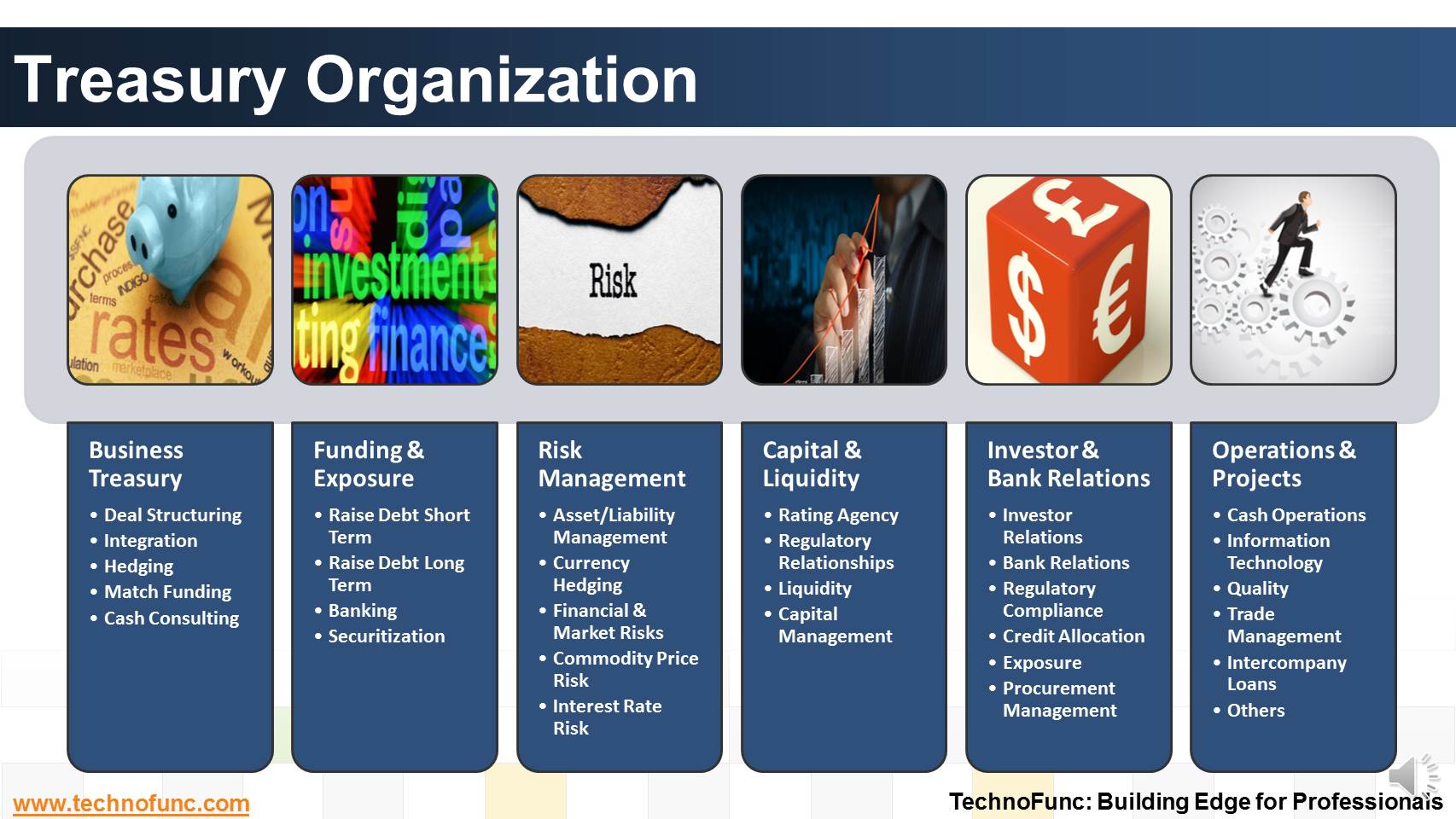- Home
- Business Processes
- Industry Knowledge
- Aerospace Industry
- Automotive Industry
- Banking Domain
- BFSI Industry
- Consumer/ FMCG Industry
- Chemicals Industry
- Engineering & Construction
- Energy Industry
- Education Domain
- Finance Domain
- Hospitality Domain
- Healthcare Industry
- Insurance Domain
- Retail Industry
- Travel and Tourism Domain
- Telecom Industry
- Leadership Skills
- eLearning
- Home
- Business Processes
- Treasury Management
- Treasury Organization
Treasury Organization
Although there is no straight forward answer to the question, how to best organize a treasury function, this article provides an generic view of the way large MNCs creates departments or sub-functions within the treasury function.
Centralization of treasury continues to be a clear trend and most organizations prefer a centralized treasury function.
Treasury is mainly organized as a cost or service center an acts as an center of excellence in corporate finance.
Some common sub-functions are-
Business Treasury
which often acts as a face to the different businesses/P&Ls within the enterprise.
- Main responsibilities include Deal structuring & integration, Hedging & match funding and Cash consulting.
- Sometimes responsible for Bank account management, disbursement facilitation, & cash management.
- Helps in temporary investment of the company's excess cash.
Funding & Exposure Management
which acts as the face to the market.
- Main responsibilities include raising debt – both short term as well as long term and Banking & securitization.
- Manages external funding and debt and also helps manage internal funding requirements by various business units through intercompany loans and transfers.
Risk Management
- Centralization is ongoing of especially risk and cash management with broadening of responsibilities – examples include group payments and collections, insurance and group credit risks
- Main responsibilities of this department include risk management, asset/Liability management, Interest Rate and currency hedging
- Asset Liability management by controlling interest rate and foreign exchange risks due to mismatches between assets and liabilities.
Capital & liquidity
- Main responsibilities include management of rating agency & regulatory relationships
- Along with Liquidity & capital management
- Capital Management to ensure various legal entities can cover unexpected losses
- Liquidity Management by monitoring and managing the liquidity profile of the enterprise
Investor & bank relations
Bank relationship strategies have become more sophisticated and a specialized department is generally responsible for managing enterprise communications.
- Main responsibilities include Relation management, Credit allocation, exposure & procurement management
- Most organizations also have an enabling arm that is responsible for day to day operations, information technology, quality, trade management etc.

Related Links
You May Also Like
-
The terms Treasury Management and Cash Management are sometimes used interchangeably, while, in fact, the scope of treasury management is larger and includes funding and investment activities as well. Learn all about Treasury Management here!
-
Treasury has increasingly become a strategic business partner across all areas of the business, adding value to the operating divisions of the company. Managing activities that were traditionally carried out within the general finance function. Learn about the drivers for this change.
-
The Cash Management component ensures that the enterprise has sufficient liquidity for payments that are due and to monitor payment flows. Learn how treasury plays an important role in cash management for the enterprise.
-
Although there is no straight forward answer to the question, how to best organize a treasury function, this article provides an generic view of the way large MNCs creates departments or sub-functions within the treasury function.
-
Treasury Management - Benefits
Effectively using treasury management with cash management and trade finance products brings tangible benefits to both corporates and financial institutions. Let us discuss some tangible benefits of treasury function.
-
Technology has enabled the treasury function by providing various solutions to manage it's complicated tasks. This article explains various types of treasury management systems available in the market.
-
Treasury Management - Functions
Treasury management has become an specialized function. Treasury function helps in managing the Risk-return profile as well as the tax-efficiency of investment instruments. In larger firms, it may also include trading in bonds, currencies and financial derivatives. Learn about the various tasks, activities and imperatives, undertaken by treasuries in in today's context.
-
The objective of funding Management is to implement strategies that lead to the best borrowing rates and lower investment costs. Learn how treasury aids in loans and investment management functions.
-
The objective of Financial risk management is to protect assets and cash flows from any risk. Treasury function works to accurately assess financial risks by identifying financial exposures including foreign exchange, interest rate, credit, commodity and other enterprise risks. Learn about the various risks that are managed by treasury.
Explore Our Free Training Articles or
Sign Up to Start With Our eLearning Courses

About Us
Learning
© 2023 TechnoFunc, All Rights Reserved










